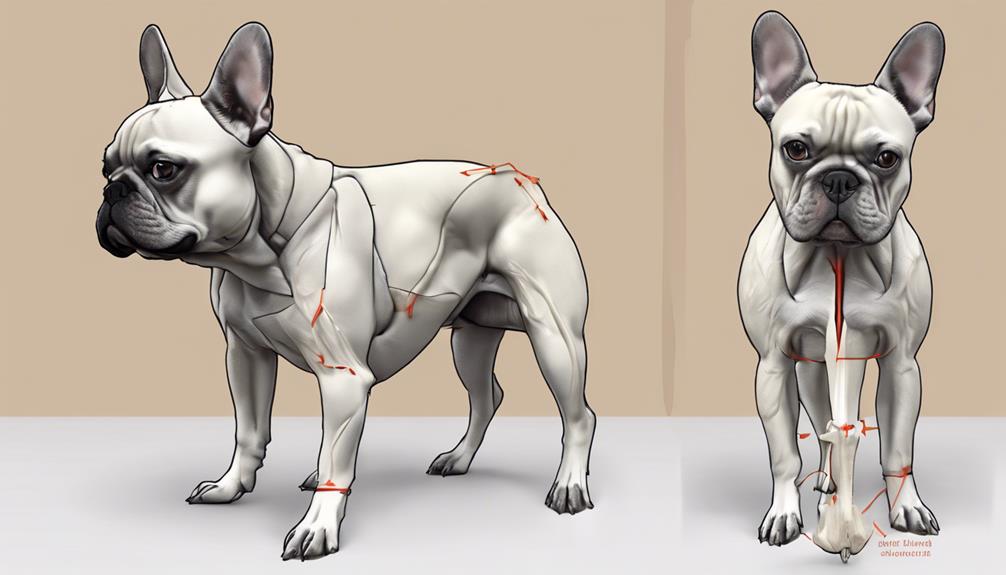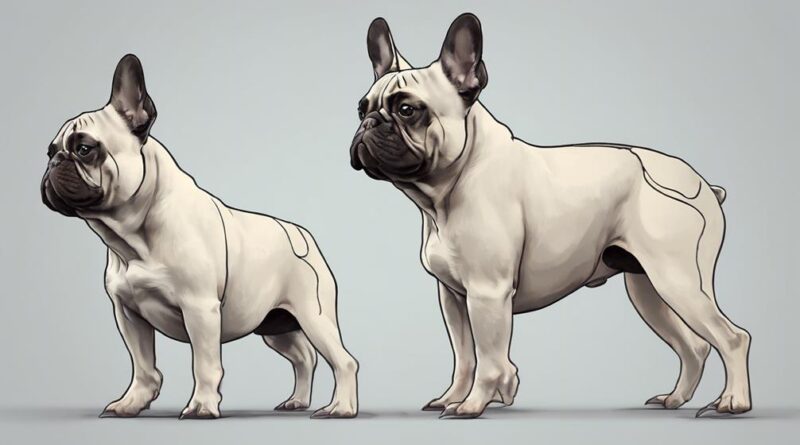7 Best-Known Bone Diseases in French Bulldogs
If you own a French Bulldog, know these 7 common bone diseases. Elbow dysplasia affects joint development, causing discomfort. Hip dysplasia concerns hip joint health, preventable with proper weight and nutrition. Patellar luxation affects kneecap positioning, leading to mobility issues. Osteochondritis dissecans targets cartilage and bone, treatable with surgery. Legg-Calvé-Perthes disease involves femoral head necrosis, requiring surgical care. Hypertrophic osteodystrophy is a bone disease common in large, growing dogs, manageable with proper nutrition. Osteosarcoma is a bone tumor needing surgery and chemotherapy. Regular vet check-ups and healthy habits safeguard your beloved pet's well-being.
Elbow Dysplasia
Elbow dysplasia is a common orthopedic condition found in French Bulldogs that affects the elbow joint's development and causes discomfort and mobility issues. To prevent elbow dysplasia in your French Bulldog, it's crucial to consider several factors. Firstly, maintaining a healthy weight through a balanced diet and regular exercise can help reduce the risk of developing this condition. Additionally, avoiding activities that put excessive strain on the elbow joint, such as jumping from heights or intense physical exercise, can also contribute to prevention.
If your French Bulldog is diagnosed with elbow dysplasia, there are several treatment options available to alleviate discomfort and improve mobility. One common approach is the use of anti-inflammatory medications to reduce pain and swelling in the affected joint. Physical therapy and low-impact exercises can also help strengthen the surrounding muscles and improve joint function. In more severe cases, surgical interventions such as arthroscopy or joint replacement may be necessary to address the underlying issues causing the dysplasia.
Hip Dysplasia
To address another common orthopedic concern in French Bulldogs, hip dysplasia affects the hip joint's development and can result in discomfort and mobility issues for your furry companion.
- Prevention is Key: Maintaining a healthy weight and providing proper nutrition can help reduce the risk of hip dysplasia in French Bulldogs.
- Early Detection Matters: Regular check-ups with your veterinarian, especially during puppyhood, can aid in early diagnosis and management of hip dysplasia.
- Surgical Options: In severe cases where conservative treatments fail to provide relief, surgical interventions like total hip replacement may be considered to improve your dog's quality of life.
- Rehabilitation is Crucial: Post-surgery, rehabilitation programs involving physical therapy and controlled exercises can aid in your French Bulldog's recovery and improve their mobility.
Hip dysplasia is a hereditary condition where the hip joint doesn't develop properly, leading to issues with mobility and discomfort. While prevention through proper care is vital, early detection allows for timely interventions. In cases where conservative treatments are ineffective, surgical options like total hip replacement can be beneficial. Following surgery, rehabilitation plays a crucial role in your French Bulldog's recovery journey. By staying informed and proactive, you can help manage and improve your furry friend's hip dysplasia for a happy and active life.
Osteochondritis Dissecans
Often occurring in French Bulldogs, Osteochondritis Dissecans is a condition where cartilage and bone within a joint fail to develop properly, potentially leading to pain and mobility issues for your pet. This condition is often found in young, rapidly growing dogs and can affect various joints, including the shoulder, elbow, hock, or stifle.
Osteochondritis Dissecans may require surgical treatment, such as arthroscopy or open-joint surgery, to remove the diseased cartilage and bone fragments. After surgery, a structured rehabilitation program is crucial to help your French Bulldog regain strength, improve joint function, and prevent further complications.
Genetic predisposition plays a significant role in the development of Osteochondritis Dissecans, making it essential to be cautious when selecting breeding pairs to reduce the risk of passing on this condition to future generations. Maintaining a healthy weight and providing proper nutrition can also help prevent the onset or progression of Osteochondritis Dissecans in your French Bulldog.
Regular veterinary check-ups, especially during the growing stages, can aid in early detection and intervention if Osteochondritis Dissecans is suspected. By being proactive and attentive to your pet's joint health, you can mitigate the impact of this condition and ensure a happy, active life for your beloved French Bulldog.
Legg-Calvé-Perthes Disease
In French Bulldogs, another bone disease that can impact your pet's joint health is Legg-Calvé-Perthes Disease, a condition that affects the hip joint and can lead to pain and mobility issues if left untreated.
- Key Points to Keep in Mind:
- Common in small dog breeds
- Avascular necrosis of the femoral head
- Typically affects younger dogs
- Surgical intervention often necessary
Legg-Calvé-Perthes Disease is characterized by the degeneration of the femoral head due to a lack of blood supply, leading to the collapse of the hip joint. Symptoms may include lameness, muscle atrophy, and pain in the affected limb. If you notice these signs, prompt veterinary attention is crucial.
Treatment Options:
- Surgery: The most common treatment involves removing the femoral head and neck to alleviate pain and improve mobility.
- Physical therapy: Post-surgery, rehabilitation exercises can help strengthen the muscles around the hip joint.
- Pain management: Medications may be prescribed to manage discomfort during recovery.
- Regular follow-ups: Monitoring your dog's progress is essential to ensure proper healing and function.
Prognosis Assessment:
The prognosis for dogs with Legg-Calvé-Perthes Disease is generally favorable after surgical intervention. Most dogs regain mobility and lead active lives post-recovery. However, early detection and treatment are key factors in achieving the best outcomes for your furry companion.
Hypertrophic Osteodystrophy
Hypertrophic Osteodystrophy, also known as HOD, is a bone disease that primarily affects rapidly growing large and giant breed dogs. This condition is characterized by growth plate abnormalities, leading to inflammation within the bone. The exact cause of HOD is unknown, but it's believed to have a genetic component and may be triggered by factors such as infections or stress.
Treatment for HOD focuses on managing the symptoms. This can include pain management, rest, and anti-inflammatory medications. In severe cases, surgery may be necessary to address complications or correct angular limb deformities that can arise from the disease.
Nutritional factors play a crucial role in the prevention of HOD. Providing a balanced diet that supports steady growth and development is essential. Rapid growth due to overfeeding or diets lacking essential nutrients can increase the risk of developing this condition. It's advisable to consult with a veterinarian to determine the most appropriate diet for your dog's specific needs.
Osteosarcoma
Osteosarcoma, a malignant bone tumor, poses a significant health concern in dogs, including French Bulldogs. This aggressive cancer primarily affects the long bones, such as the legs, and can spread rapidly to other parts of the body. Here's what you need to know about osteosarcoma in French Bulldogs:
- Pain Management: Osteosarcoma can cause significant pain and discomfort for your furry friend. It's essential to work closely with your veterinarian to develop a pain management plan that ensures your French Bulldog's comfort.
- Treatment Options: Treatment for osteosarcoma often involves a combination of surgery, chemotherapy, and radiation therapy. Your veterinarian will tailor the treatment plan to your dog's specific needs and overall health.
- Prognosis: The prognosis for dogs with osteosarcoma can vary depending on various factors, including the stage of the cancer and how early it was diagnosed. Early detection and aggressive treatment can help improve your French Bulldog's prognosis.
- Risk Factors and Prevention: While the exact cause of osteosarcoma is unknown, certain risk factors, such as genetics and breed predisposition, may increase the likelihood of developing this cancer. Unfortunately, there are no concrete prevention methods for osteosarcoma, emphasizing the importance of regular veterinary check-ups for early detection.
Being informed about osteosarcoma and its implications can help you make the best decisions for your French Bulldog's health and well-being.
Patellar Luxation

Patellar luxation, a common orthopedic condition in dogs like French Bulldogs, affects the kneecap's positioning and can lead to discomfort and mobility issues. This condition occurs when the patella (kneecap) dislocates or moves out of its normal position within the femoral groove. In French Bulldogs, a breed known for its predisposition to joint issues, patellar luxation can be a concern.
When addressing patellar luxation in French Bulldogs, surgical options are often considered to correct the malalignment of the patella. Surgical procedures aim to realign the patella properly within the femoral groove, improving the dog's comfort and mobility. Following surgery, rehabilitation is crucial to help the dog regain strength and range of motion in the affected limb. Physical therapy, controlled exercise, and monitoring by a veterinarian are key components of the rehabilitation process.
Preventative measures and lifestyle changes can also play a significant role in managing patellar luxation in French Bulldogs. Maintaining a healthy weight through proper diet and exercise can reduce the strain on the joints. Avoiding activities that put excessive stress on the knees can help prevent exacerbation of the condition. Regular veterinary check-ups are essential for early detection and management of patellar luxation in French Bulldogs. By being proactive and attentive to your dog's needs, you can help minimize the impact of this orthopedic condition on their quality of life.
Frequently Asked Questions
Can French Bulldogs With Bone Diseases Still Lead an Active Lifestyle?
You can still help your French Bulldog with bone diseases lead an active lifestyle. By making exercise modifications and managing pain effectively, you can ensure their comfort and well-being.
Quality of life is crucial, and there are rehabilitation options available to improve their mobility and strength. With proper care and attention, your furry friend can continue to enjoy a fulfilling and active life despite their bone disease.
Are There Any Preventive Measures to Reduce the Risk of Bone Diseases?
To reduce the risk of bone diseases in French Bulldogs, focus on nutrition management by feeding a balanced diet rich in essential nutrients.
Implement regular exercise routines to keep the bones healthy and strong.
Consider supplement options like calcium and vitamin D under veterinary guidance.
Pay attention to environmental factors such as providing a safe and comfortable living space.
Taking these preventive measures can help support your French Bulldog's bone health and overall well-being.
How Common Are Bone Diseases in French Bulldogs Compared to Other Breeds?
Bone disease prevalence in French Bulldogs can vary, but they're known to be prone to certain skeletal issues due to their unique breed characteristics.
While they may not have the highest rate of bone diseases compared to some other breeds, their flat faces and compact bodies can increase the risk.
Regular vet check-ups and appropriate exercise can help manage these concerns and keep your Frenchie healthy.
Are There Any Alternative Treatments Available for Bone Diseases in French Bulldogs?
When addressing bone diseases in French Bulldogs, there are alternative treatments available. Holistic treatments, such as natural remedies and nutritional supplements, can complement traditional methods.
Physical therapy is beneficial for improving mobility and strength. Incorporating a well-balanced diet with essential nutrients can support bone health.
Consulting with a veterinarian can help determine the best combination of treatments for your French Bulldog's specific condition.
Can Bone Diseases in French Bulldogs Be Hereditary?
Yes, bone diseases in French Bulldogs can be hereditary. Understanding inheritance patterns through genetic testing is crucial.
To prevent passing on these conditions, responsible ownership includes breeding restrictions. By being informed and selective about breeding, you can help reduce the likelihood of bone diseases being passed down to future generations of French Bulldogs.
Prioritize the health and well-being of the dogs by taking these steps.
Conclusion
In conclusion, French bulldogs are prone to various bone diseases that can significantly impact their quality of life.
It's important for owners to be aware of these conditions and take preventive measures to ensure the health and well-being of their furry companions.
Regular veterinary check-ups, proper nutrition, and exercise can help mitigate the risks associated with these bone diseases.
Stay informed and proactive in caring for your French bulldog to help them live a long and healthy life.
